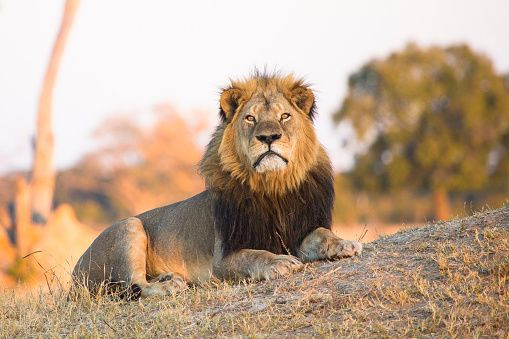Xanda, Cecil The Lion's Son, Killed By Trophy Hunter

The son of Cecil the lion—Zimbabwe’s famous cat who had been killed two years ago by an American trophy hunter—has met a fate similar to his dad, the BBC reported.
Six-year-old Xanda was shot by a hunter outside the Hwange National Park in Zimbabwe while he was on a safari organized by Richard Cooke, a licensed professional guide. Cooke's clients, who might have paid tens of thousands of dollars are not yet known, according to a report by The Guardian.
Because the lion was over the age of six and outside the park’s boundaries, the kill was legal in the country.
Watch: Lioness Seen Nursing Leopard Cub For First Time
The young lion was the pride male of a group that included two lionesses and several cubs. He was fitted with a collar enabled with a GPS tracker by scientists at Oxford University led by Andrew Loveridge. Cooke saw the collar and reported the death to authorities.
“Xanda was one of these gorgeous Kalahari lions, with a big mane, big body, beautiful condition - a very, very lovely animal,” Loveridge told the Guardian. “Personally, I think it is sad that anyone wants to shoot a lion, but there are people who will pay money to do that,” he added. A similar collar was fitted on Xanda’s father Cecil.
In a Facebook post, the group ‘Lions of Hwange National Park’ claimed that Cooke also killed Xanda's brother in 2015. Expressing outrage, it said: “We can't believe that now, 2 years since Cecil was killed, that his oldest Cub #Xanda has met the same fate. When will the Lions of Hwange National Park be left to live out their years as wild born free lions should...?”
Cecil, the lion that had so endeared himself to tourists was shot and wounded with a bow and arrow by Walter Palmer, 57, a dentist from Minnesota, on July 1, 2015, very close to the place where Xanda died. The kill caused global outrage and protesters gathered outside Palmer’s dental clinic in Minnesota, demanding that he be extradited to face trial in Zimbabwe for participating in a purportedly illegal hunt.
Read: Animals That Have Gone Extinct In The Last 150 Years, Thanks To Hunters
Palmer was cleared in October 2015, after his hunting papers were found to be in order. Palmer was quoted saying in an interview in September that same year: “If I had known this lion had a name and was important to the country or a study, obviously, I wouldn’t have taken it.”
While many have raised their voices against trophy hunting, there are also supporters, including Loveridge, who say the practice provides valuable funds to authorities that can be used for conservation.
The Guardian also said that scientists want a 3-mile no-hunting zone around the Hwange National Park. “It is something we have suggested for years,” Loveridge said. “But there is a lot of resistance because a lot of the hunting happens right on the boundary, because that is where the animals are.”
© Copyright IBTimes 2024. All rights reserved.





















